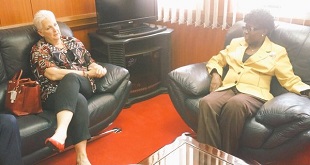
In Zambia, Brook, says jobs fell from 25,000 in the 1980s to below 10,000 in 2002; and in Nigeria from employing some 200,000 workers to being negligible. And off course, Uganda, and the rest of East African Community states textile industry, was not spared either.
It is against this backdrop that Uganda and the rest of the EAC states are proposing to ban all second-hand clothes and shoes in the next three years to stir the growth of local textile industries, aimed at creating employment opportunities, reduce poverty, and advance in technological capability.
But researchers and development economists disagree with the region’s move. Brook, who is also an academician at King’s College London, say stopping the trade in second-hand clothes will not enable the development of clothing industries in Africa because there’s no concrete evidence to suggest that the move will lead to a growth of local garment industries.
Asiimwe, too, says the East African government should first regulate and not ban the importation of second hand clothes, and the related items to avoid negative impact on the livelihoods of the population who rely on the commodities.
“… and even if it was banning it should be in a phased approach not a bang, and should be synchronised with growth in domestic textile industrialisation so that there is no shortage for the poor,” he suggests.
Linda Calabrese, a development economist and researchers at the Overseas Development Institute (ODI), a UK’s leading independent think tank on international development and humanitarian issues, says East Africa’s plan to ban import of second-hand clothes in favour of the locally made is not the right strategy.
First, it has not always worked, she says, because many Latin American countries tried import substitution to shield their nascent industries from external competition in the twentieth century but the results were largely disappointing and included lower industrial growth, and presence of low quality goods on the domestic markets.
Secondly, the ban raises a problem for East Africans. Banning imports of used clothes and shoes means that the population has to choose between buying new imported goods or buying domestically produced goods.
And if it means buying the locally made, then, consumers in the region will have to spend more on these goods, burdening mainly the poor, who wore the second-hand products.
As such, Calabrese says, there are better ways to promote the garment sector in East Africa and create a vibrant manufacturing sector- reducing costs faced by manufacturers to ensure that they can produce at a profit.
“This could mean improving infrastructure – providing a good feeder road from the factory to the main road, and a good main road to the border; or ensuring a cheap and reliable supply of power,” said Calabrese, who has in the past stayed in Uganda and Rwanda.
“Or it could mean designing appropriate incentives- tax relief for producers, export incentives for firms targeting international markets, or asking foreign firms to use domestic inputs and labour, while at the same time promoting sectors that are linked to the one to be developed.”
These types of measures, she says, actually work, citing the East Asian tigers where governments took an active role in promoting the development of their manufacturing sectors.
But even as this debate continues on whether or not to ban entry of second-hand clothes in the region, some African countries have already done so or restricted their importation and or sale.
For instance, Nigeria, Ethiopia, Eretria have fully banned their import and resale, while South Africa allows only the importation of used clothes that are to be donated and not sold.
On the other hand, Tanzania, Ghana, Zambia, and Zimbabwe restrict only the sale of second-hand intimate wear or other textile products that may pose a health risk.
****
editor@independent.co.ug
 The Independent Uganda: You get the Truth we Pay the Price
The Independent Uganda: You get the Truth we Pay the Price





